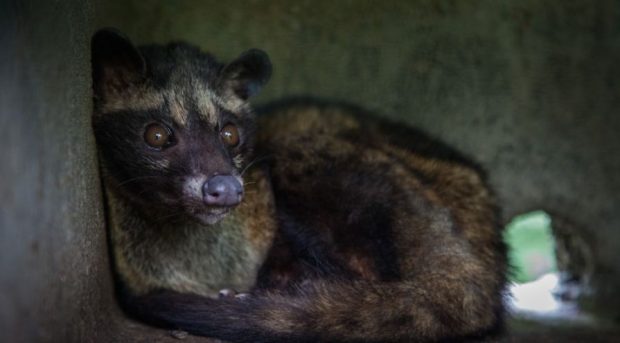Noting a “rapidly expanding” tourism industry surrounding Kopi Luwak (a.k.a. civet coffee) in recent years, the nonprofit agency World Animal Protection is renewing its call to consumers and sellers of Kopi Luwak coffee to avoid coffees from producers caging the cat-like Asian palm civets for production.
In a recent report published in the journal “Animal Welfare” WAP authors say they have discovered at least 16 plantations on a popular tourist corridor in Bali, Indonesia, within the past five years, marketing and selling Kopi Luwak coffee to tourists.
“Fourteen of the 16 plantations produced the caged civet coffee on-site, and two plantations that did not produce caged coffee on-site confirmed that they kept civets in cages purely as a tourist attraction to illustrate to tourists how the coffee is made,” WAP said in an announcement of the study. (Until June 2014, the agency was formerly known as the World Society for the Protection of Animals.)
Kopi Luwak coffee is traditionally harvested from the droppings of palm civets in the wild, although increased demand in recent years has resulted in the well-documented practice of caging and force-feeding the wild animals for increased production control and efficiency. The coffee has been marketed and sold as a high-end luxury item, fetching into the hundreds of dollars per roasted pound.
“When tourists see the caged civets, it helps to convince them that they are drinking genuine real civet coffee as part of their tour,” said WAP’s Neil D’Cruze. “Sadly, many tourists are blind to the cruelty associated with caged civet coffee and even line up to take a photo to share on social media.”
WAP suggests that the high market prices for genuine Kopi Luwak coffee have created an “enslavement industry,” in which civets are put in cramped cages with wire floors that cut into their feet, and don’t allow for shelter to hide, causing physical and mental distress. Said WAP, “Many of the civet coffee farmers are uneducated on how to care for their animals, and the civets often become ill or die, all in the name of making coffee.”
The organization is urging tourists maintaining an interest in Kopi Luwak coffee to seek out producers who can demonstrate cage free production practices. Some agricultural certification and standards agencies — including UTZ and the Sustainable Agriculture Network — have explicitly updated their standards to disallow producers using caged animals to achieve certification.
“Detecting cruel civet coffee remains a constant challenge because of the difficulty in distinguishing between beans from caged or wild civet cats,” said WAP study joint-author Jan Schmidt-Burbach. “However, if tourists see civets in cages as part of their tour, this is a clear indication that unnecessary animal abuse is involved.”
Nick Brown
Nick Brown is the editor of Daily Coffee News by Roast Magazine.







Comment